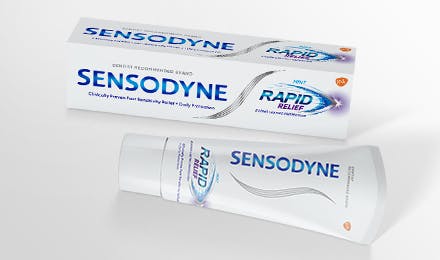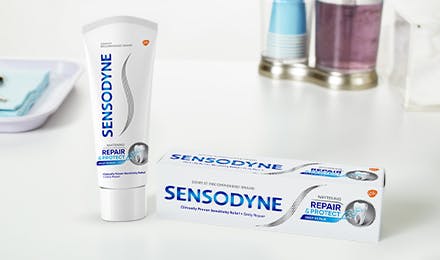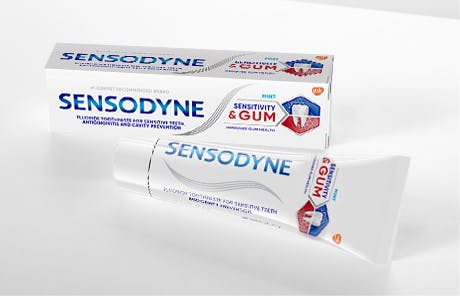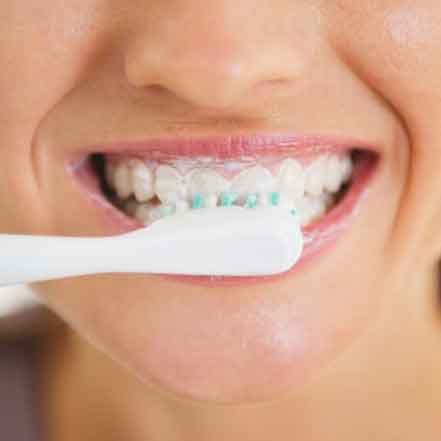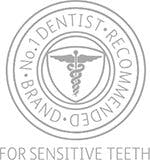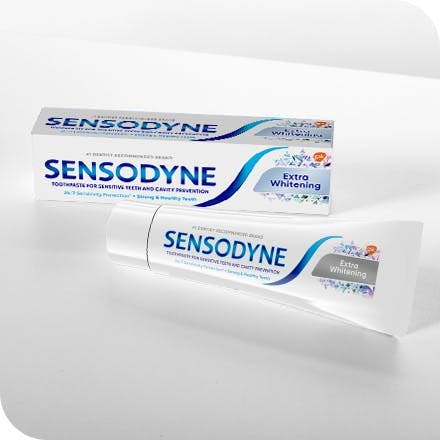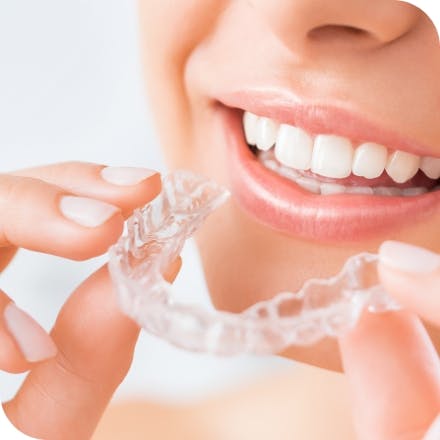Whitening Home Remedies May Affect Sensitive Teeth
Age, red wine, coffee, smoking and certain medications can all affect teeth and lead to discoloration.i If you want a brighter smile, you may consider teeth whitening home treatments such as whitening strips, trays and bleaching kits to help whiten your teeth.
These home treatments for teeth whitening lighten your teeth with bleach, which triggers a chemical reaction to change the color of your teeth. However, they can also cause temporary tooth sensitivity.ii It’s important to know the facts about at-home teeth whitening treatments and how to use them before you decide to try them out. Ask your dentist about the best at-home whitening treatments for sensitive teeth before trying home remedies on your own.
Find out more about whitening sensitive teeth.
Teeth Whitening Home Treatments: The Pros and Cons
Over-the-counter teeth whitening home treatments may be more cost effective than professional whitening. However, some bleaching options can increase tooth sensitivity and irritate gums. The good news is both side effects will usually disappear within days of the whitening treatment.ii
Home-whitening treatments only work on natural teeth and not on tooth-colored fillings, crowns, veneers, implants or bridges. Whitening your teeth if you have had this dental work done may cause differences in color between your natural and artificial teeth.ii Learn more about removing stains from sensitive teeth.
Teeth Whitening Home Remedies
If you’re looking for a whiter, brighter smile, you may be considering one of the many teeth whitening home treatments available. Consider the pros and cons of each treatment so you can make an informed choice about which is right for your sensitive teeth.
Home Whitening Strips
Over-the-counter strips are a popular way to whiten teeth at home. Designed to mold to the surface of your teeth, these slim, virtually invisible, plastic strips are coated in a thin layer of whitening gel made of peroxide.ii, iii Once you have applied the whitening strips, a chemical reaction takes place and breaks down existing surface stains on your teeth.ii
How often you should use whitening strips varies from product to product, so always check the label and follow the package instructions.
Whitening Gels
These are peroxide-based gels which you apply with a small brush directly to the surface of your teeth. They work in the same way as home whitening strips to remove surface stains and discoloration.iii
Whitening (Bleaching) Trays
Over-the-counter tray-based whitening kits are filled with peroxide gel and fit over your teeth.iii While they save you a trip to the dentist, these kinds of whitening trays may not always fit properly, meaning some of the bleaching gel can leak from the tray, causing blistering and sensitivity.iv Trays made in-office by your dentist, on the other hand, are custom made for your mouth and therefore much more likely to fit properly.
Bleaching trays can begin to lighten teeth in as little as three days – typically by one or two shades.iii
Whitening Rinses (Mouthwashes)
Whitening rinses contain hydrogen peroxide (bleach) to help whiten teeth. Typically, this whitening technique requires you to rinse your mouth for around 60 seconds, twice a day. It will generally take around 12 weeks to see a one or two shade change in the color of your teeth.iii
Stain-Removing Toothpastes
Stain-removing toothpastes, such as Sensodyne Extra Whitening toothpaste, contain mild abrasives as well as polishing agents. Unlike bleach-based products, they don’t change your actual tooth color, but instead help to remove tough surface stains from your teeth and make them appear whiter.
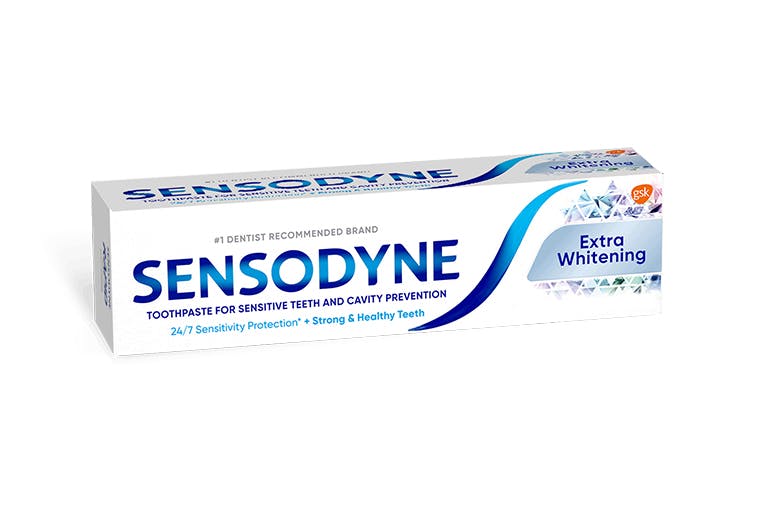
Whiten Your Sensitive Teeth with Sensodyne Whitening Toothpastes
The biggest drawback of both professional and at-home teeth whitening is increased tooth sensitivity and the risk of irritated gums. Sensodyne Extra Whitening toothpaste is an ideal choice if you have sensitive teeth. Brushing twice daily with this number one dentist-recommended toothpaste brand for sensitivity helps gently lift surface stains. It also calms the nerves deep inside the tooth to help protect against tooth sensitivity.
If you want clinically proven whitening technology, try Sensodyne Clinical White. Sensodyne Clinical White can whiten teeth two shades lighter after eight weeks of twice daily brushing*. In addition to whitening action, Sensodyne Clinical White provides 24/7 sensitivity protection,** making it a great option for individuals who want to whiten their sensitive teeth at home.
*as shown in an 8 week study
**with twice daily brushing
Discover the full Sensodyne teeth whitening toothpaste range.
SOURCES
By clicking any of the links below you will be taken to an external website that is independently operated and not managed by GSK. GSK assumes no responsibility for the content on the website. If you do not wish to leave this website, do not click on the links below.
i. Tooth Discoloration: Why Do Teeth Darken? Cleveland Clinic. https://my.clevelandclinic.org/health/diseases/10958-tooth-discoloration Accessed on 28/11/19
ii. Whitening. American Dental Association. https://www.ada.org/en/member-center/oral-health-topics/whitening. Accessed 02/04/20.
iii. Tooth Whitening: What We Now Know. Journal of Evidence-Based Dental Practice (June 2014). https://www.ncbi.nlm.nih.gov/pmc/articles/PMC4058574/. Accessed on 02/04/20.
iv. Teeth whitening. NHS. https://www.nhs.uk/live-well/healthy-body/teeth-whitening/. Accessed February 23, 2021.


